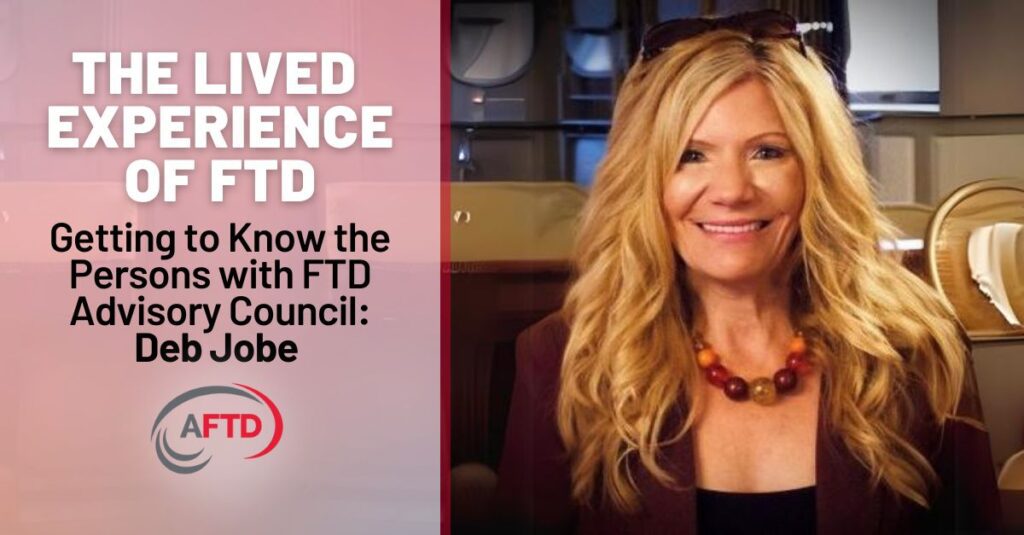Die gelebte Erfahrung von FTD: Lernen Sie die Menschen mit FTD kennen. Beirat: Deb Jobe

Formally chartered in 2020, the Personen mit FTD-Beirat works to ensure that the insights and perspectives of people living with FTD are included in the development of AFTD’s policies, programs, and services. The stories of members like Deb Jobe, who joined the council recently, help illustrate what FTD is truly like to challenge the stigma that persons diagnosed often face.
Noticing Signs
Deb Jobe was used to collaborating within multiple management levels. Working for a human capital management organization, she oversaw client relations for global Fortune 500 customers, presenting to key stakeholders and other high-level decision makers.
Over time, though, Jobe started noticing that although she intended to say one thing, something completely random would come out of her mouth. For a while, she played it off as if she had not had enough coffee. But then she became unable to grasp new concepts or follow new processes, and eventually, her husband, who was worried about her worsening memory, pushed her to go to the doctor.
FTD Diagnosis
The average time between the onset of FTD symptoms and getting a correct diagnosis is 3.6 years. But Jobe found doctors who took her story seriously and who were determined to find out what was causing her lapses. Her primary care doctor ordered an MRI and sent her to a neurologist, and she underwent a PET scan and lumbar puncture.
Though the tests were inconclusive, Jobe’s doctors gave her a tentative diagnosis of FTD; a second opinion changed the diagnosis to “Alzheimer’s adjacent.” Finally, after she and her husband moved to St. Louis, she met with neurologists at Washington University. There, she was diagnosed with corticobasal syndrome (CBS), an FTD subtype.
The journey to a correct diagnosis was shorter for Jobe than it was for most – just over two years. But she says she is lucky – while living with her preliminary diagnoses, she was able to receive physical, occupational, speech, and cognitive behavioral therapy. “I am so blessed to have access to excellent therapies and tools like a NovaChat,” a speech-generating device that helps her when her words get stuck or come out wrong, she told AFTD recently.
Because of her FTD, Jobe had to end her career, which she said was very traumatic. “Work was part of me,” Jobe said. “I had a 34-year career, but I was no longer able to do the work. I was devastated.” She spent her time researching FTD, eventually finding AFTD’s website. She was startled to learn that it can occur when people are relatively young, “smack dab in the middle of life,” as she put it.
Personen mit FTD-Beirat
Jobe became an AFTD volunteer, and she now serves on the AFTD Personen mit FTD-Beirat. “I believe it is vital to have our voices at the table, both within AFTD and externally,” she said. “We are there to bring the experiences, feelings, and thoughts to the fore – whether it’s to help inform policy or to help people who are in the process of getting diagnosed understand the FTD journey.”
Jobe defines what she sees as her mission on the Persons with FTD Advisory Council: to “empower those of us living with dementia to make a difference by talking about our lived experience to expand awareness about FTD.”
Although she left her career in response to her diagnosis, Jobe said she continues to live a rich, rewarding life, something she wants others who are newly diagnosed to understand. “I live near my daughter and grandson, who I see often. My husband does the cooking now, but I can help. And we continue to find tools and strategies to support me,” she said.
Despite her FTD journey, Jobe is a portrait of positivity and endurance. Her determination to use her time on the Persons with FTD Advisory Council to spread FTD awareness and education is rooted in a desire to help others facing an FTD diagnosis. “It does not have to be the end of the world,” she said. “You can live well with FTD.”
Nach Kategorie
Unsere Newsletter
Bleib informiert
Melden Sie sich jetzt an und bleiben Sie mit unserem Newsletter, Veranstaltungsbenachrichtigungen und mehr auf dem Laufenden …
